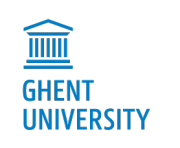General information
The course provides a thorough theoretical knowledge as well as practical training on the following procedures used when working with fish: transportation, handling, sedation/anesthesia, how to recognize disease, sampling (living fish (skin, gill, blood, feces)), necropsy & sampling, injection, treatment options for diseases. It is organized in the framework of the Marine-at-Ugent doctoral programme.
Tentative Programme
| 8h30-12h50 |
Theoretical course about "Techniques in aquaculture (transportation, handling, sedation/anesthesia, how to recognize disease, sampling (living fish (skin, gill, blood, feces)), necropsy & sampling, injection, treatment) part I Theory Prof. dr. A. Decostere |
| 12u50-14u00 | Lunch break |
| 14u00-17u00 |
Practical with live fish "Techniques in aquaculture: clinical examination, sampling (living fish (skin/gill, blood)), anesthesia, injection, euthanasia, necropsy & sampling, diagnostic techniques. Prof. dr. A. Decostere and Prof. dr. K. Hermans |
Keywords: handling, transporting, fish, disease, sampling, sedation, anesthesia, necropsy
Contacts: Annemie Decostere (Annemie.Decostere@UGent.be) and Katleen Hermans (Katleen.Hermans@UGent.be)
The student has theoretical and practical knowledge on the following techniques in fish:
- transportation
- handling
- sedation/anesthesia
- how to recognize disease
- sampling (living fish (skin, gill, blood, feces))
- necropsy & sampling
- injection
The aim of the course is to understand the importance of transporting, handling and maintaining fish in a correct way so as to minimise stress and lesion infliction. An additional objective is to teach the students theoretical and practical aspects of different techniques needed when working with live fish amongst which disease recognition and mitigation are involved.
Content
The highlighted icons, represent the fields of education (in compliance with ISCED Classification) engaged during this course/programme.
Venue
Merelbeke, Belgium
Faculty of Veterinary Medicine: auditorium "Kliniek D"
Application
Cost:
<p class="rtejustify">No participation fees are asked from the participants. Participants do need to take into account they will have to take care of their own transportation, accommodation and food. Copies of the handouts of the theoretical part of the course will be provided.</p>
Prerequisites:
Participants should hold a master degree with a background in biological and/or medical sciences, and be proficient in English (spoken and written).
Application Procedure:
Applicants are asked to send their curriculum vitae, a motivation letter and proofs of English language proficiency at: Annemie.Decostere@UGent.be or Katleen.Hermans@UGent.be.
Application deadline: 5th November 2014
Qualification
Assessment:
No formal assessment will be carried out. Permanent evaluation of participation during the course day will be done.
The course provides a thorough theoretical knowledge as well as practical training on the following procedures used when working with fish: transportation, handling, sedation/anesthesia, how to recognize disease, sampling (living fish (skin, gill, blood, feces)), necropsy & sampling, injection, treatment options for diseases. It is organized in the framework of the Marine-at-Ugent doctoral programme.
Tentative Programme
| 8h30-12h50 |
Theoretical course about "Techniques in aquaculture (transportation, handling, sedation/anesthesia, how to recognize disease, sampling (living fish (skin, gill, blood, feces)), necropsy & sampling, injection, treatment) part I Theory Prof. dr. A. Decostere |
| 12u50-14u00 | Lunch break |
| 14u00-17u00 |
Practical with live fish "Techniques in aquaculture: clinical examination, sampling (living fish (skin/gill, blood)), anesthesia, injection, euthanasia, necropsy & sampling, diagnostic techniques. Prof. dr. A. Decostere and Prof. dr. K. Hermans |
Keywords: handling, transporting, fish, disease, sampling, sedation, anesthesia, necropsy
Contacts: Annemie Decostere (Annemie.Decostere@UGent.be) and Katleen Hermans (Katleen.Hermans@UGent.be)
Applicants are asked to send their curriculum vitae, a motivation letter and proofs of English language proficiency at: Annemie.Decostere@UGent.be or Katleen.Hermans@UGent.be.
Application deadline: 5th November 2014
No formal assessment will be carried out. Permanent evaluation of participation during the course day will be done.
The student has theoretical and practical knowledge on the following techniques in fish:
- transportation
- handling
- sedation/anesthesia
- how to recognize disease
- sampling (living fish (skin, gill, blood, feces))
- necropsy & sampling
- injection
The aim of the course is to understand the importance of transporting, handling and maintaining fish in a correct way so as to minimise stress and lesion infliction. An additional objective is to teach the students theoretical and practical aspects of different techniques needed when working with live fish amongst which disease recognition and mitigation are involved.
Participants should hold a master degree with a background in biological and/or medical sciences, and be proficient in English (spoken and written).

 Universiteit Gent (Ghent University)
Universiteit Gent (Ghent University)

